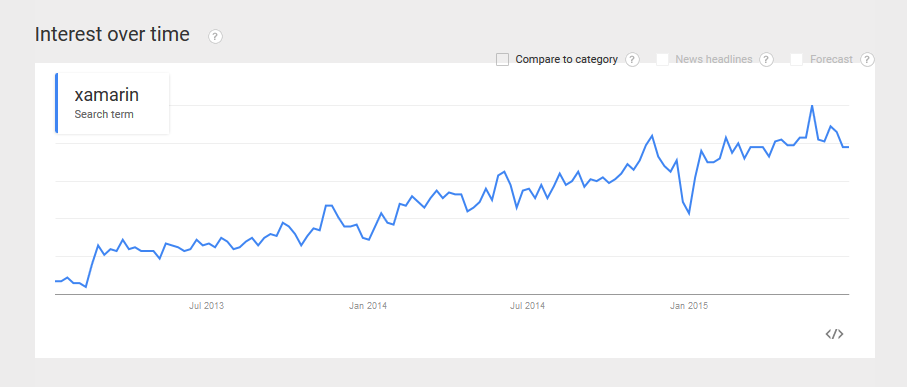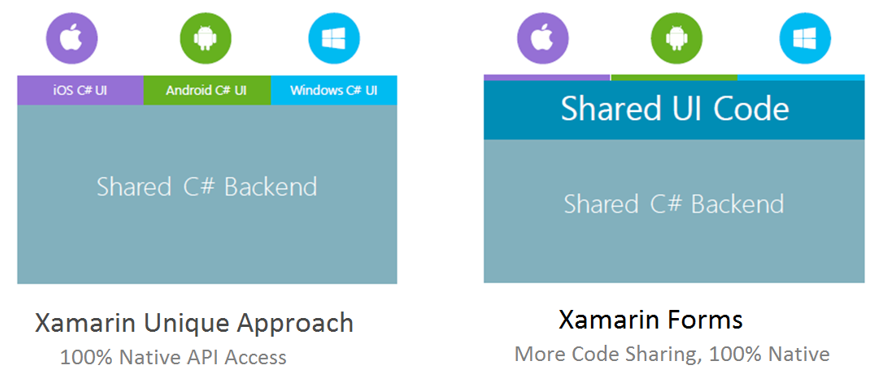Why Use Xamarin for Mobile App Development
In this article, we discuss why the Xamarin framework is a great option for your next mobile application development project.
Join the DZone community and get the full member experience.
Join For FreeCross-platform refers to the development of mobile apps that work on multiple mobile platforms. For example, a cross-platform mobile application runs easily on different mobile operating systems like Android, iOS, Windows, and BlackBerry.
There are many cross-platform frameworks that exist to support cross-platform development, such as Qt, Xamarin, Phonegap, Ionic, and React Native.
In this post below, I am going to talk about Xamarin in particular and the reasons to use Xamarin for cross-platform development.
Xamarin Introduction
Xamarin is a cross-platform framework for mobile app development that brings .NET and C# to both Android and iOS platforms. Xamarin is amazing in the sense that it is fully .NET based and is able to produce true Android and iOS mobile apps concurrently.
Wikipedia defines Xamarin as follows:
"Xamarin is a Microsoft-owned San Francisco, California based software company founded in May 2011 by the engineers that created Mono, Mono for Android, and MonoTouch that are cross-platform implementations of the Common Language Infrastructure (CLI) and Common Language Specifications (often called Microsoft .NET)."
Quick facts about Xamarin:
- Xamarin is one of the most cost-effective and time-efficient platforms used for building apps for different operating systems.
- Instead of designing an app for each system separately, app developers can share about 75 to 90 percent of developed code across all major mobile platforms, which decreases cost and time-to-market.
- Xamarin delivers high performance and an excellent UX.
- It ensures seamless integration and provides quality assurance and functionality testing on a wide range of devices.
These are some of Xamarin’s best features:
- Power of C# on mobile devices
- Open source
- Faster development
- Native apps with native user interface (UI) controls
- Native UI development
- Can share more than 70 to 80 percent of code across all major mobile platforms
Why Xamarin?
Xamarin is ideal for iOS and Android cross-platform development. Here are the major reasons why:
It’s Not Limited to Mobile App Development
Code Reusability
It Supports Smartwatch Apps
Simplified Maintenance
Seamless Designs With Xamarin.Forms
Native Application Programming Interface Access
You can share more than 70-80% of your code across all major mobile platforms.
Ability to leverage Visual Studio.
Many great C# libraries.
MVVM pattern.
Amazing support.
Powerful Mono .NET framework for developers.
Delivers high performance and excellent UX.
Most cost- and time-efficient cross-platform framework for mobile app development.
Compatible with developing hybrid apps using the portable Razor framework.
Backed by Microsoft.
Supports smartwatch apps.
Nat Friedman, CEO and co-founder of Xamarin said:
"We founded Xamarin more than [four] years ago with the mission to make native mobile development fast, easy, and fun and to help C# developers build beautiful mobile apps and reach billions of devices. We love the native iOS, Android, and Mac APIs and we love C#."
The Popularity of Xamarin
If you have not tried Xamarin yet, you are missing out. With the Xamarin framework, we can cover all major mobile platforms like Android, iOS, and Windows without diluting the quality and performance of our code.
Over 15,000 companies rely on Xamarin.
Renowned companies like Cognizant, Bosch, Siemens, LEAP, 3M, Slack, and Pinterest rely on Xamarin for their mobile app development source


Two Approaches in Xamarin Architecture
Xamarin has two methods for building cross-platform mobile applications:
Xamarin Forms – You can use Xamarin.Forms when you want to design your app one time and share it across all platforms with some minor code changes.
Xamarin Native – You can use Xamarin Native when you want to design separate applications for each platform with the help of Xamarin.iOS, Xamarin.Android, and Xamarin.Windows libraries.

The Difference Between Xamarin Forms and Xamarin Native

Xamarin.iOS, Xamarin.Android, and Xamarin. Windows |
Xamarin Forms |
Separate UI for each platform. |
Single UI for all platforms. |
Supports up to 70% code reuse. |
It allows more code sharing (90-100% code reuse). |
The development cycle is a bit slower in comparison. |
The development cycle is faster. |
Need to learn all the existing platforms specific to native UI views. |
No need to learn all the existing platforms specific to native UI views. |
Xamarin Native has a large variety of UI and third-party components library. |
Xamarin Forms has little in the way of third-party components libraries. |
Xamarin Native app development costs are comparatively higher. |
Xamarin Forms App development significantly reduces overall cost. |
Xamarin Native app's performance is the best. |
Xamarin Forms performance is slightly slower. |
Xamarin Native is recommended where custom UI is more important than code sharing. |
Xamarin Forms is recommended where code sharing is more important than custom UI. |
Xamarin Native is best for apps with interactions that require native behavior. |
Xamarin.Forms is best for apps that require little platform-specific functionality. |
Xamarin native has a stronger mechanism to clear the cache. |
Xamarin Forms has less mechanisms to clear the cache. |
Xamarin Native is used to create complex and advanced UI. |
Xamarin.Forms is used for apps with few constraints on the UI. |
Xamarin Native supports non-portable .NET Libraries. |
Xamarin Forms does not support some of the third-party component libraries. |
Xamarin Native apps are better suited for a large quantity of data and it is also effective for frequent data update. |
Xamarin Forms apps are not ideal for a large quantity of data and not effective for frequent data update. |
Xamarin Native is best for apps that require specialized interactions. |
Xamarin.Forms is best for apps that are data-driven (listviews, data entry fields). |
Opinions expressed by DZone contributors are their own.

Comments